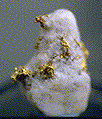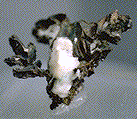

- Chemistry: TiN, Titanium Nitride
- Class: Native Elements
- Subclass: Nitrides
- Series:
Osbornite-Sinoite - Uses: Only as mineral specimens.
Specimens
Although osbornite is a compound and not an element, it is still classified in the
Native Elements Class as an
elemental compound (an oxymoron for sure).
This is basically because it is difficult to put in any other class!
Since it lacks oxygen or halides, it can not be classified in any class except the elements or the
sulfides.
Although it lacks sulfur, it could have been classified as a sulfide as the
arsenides are.
But osbornite's chemical bonds are more similar to the chemical bonds in elements like
PHYSICAL CHARACTERISTICS:
- Color is bronze yellow to golden yellow.
- Luster is metallic.
- Transparency: Crystals are opaque.
- Crystal System is isometric; 4/m bar 3 2/m.
- Crystal Habits include small disseminated grains in meteorites.
- Hardness is 7.
- Specific Gravity is 5.3 - 5.4 (above average for metallic minerals)
- Associated Minerals include
iron-nickel,
sinoinite ,cohenite ,schreibersite ,oldhamite ,troilite , plagioclase and enstatite - Notable Occurrences include Gorakhpur, Basti district, Uttar Pradesh, India; the site at which the Bustee meteorite was found and other enstatite chondrite meteorite sites.
- Best Field Indicator is color, source, associations and density.







